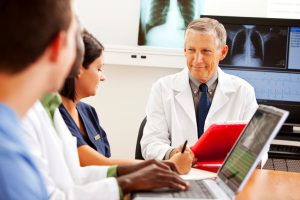
Gaining clinical experience is not limited to Biological Sciences majors or pre-medicine students. It’s a crucial experiential learning activity for anyone who is interested in learning more about career options in healthcare or may be considering graduate study.
While there is no official, overarching definition for the term “clinical experience,” it generally involves a hospital or healthcare setting and some level of patient contact. For most undergraduate students, this experience falls into three categories: shadowing, volunteering, and completing an internship or research project.
Shadowing is a great way to learn about careers in healthcare, because it provides students with key insights into a “day in the life” of the care team. While one may have a general sense of what a nurse does, the nuances and complexities of a nurse’s role are most easily observed through a shadowing experience. Shadowing generally doesn’t involve direct patient contact, but the observer instead follows a healthcare provider over the course of one day or multiple sessions. If you are still exploring your options, shadowing might serve as an excellent avenue to clarify your career goals. Even if you’re sure of your goals, I still highly recommend shadowing each member of the care team (including physician assistants, nurses, pharmacists, and physical therapists, to name a few) to get a sense of how your desired profession typically works with the group.
Are you interested in a more hands-on experience? If that’s the case, you may want to consider volunteering. You may have some direct patient contact, and if you have any certifications or licensure, you may be able to get even more involved. Volunteering can be short-term, project-based, or long-term, and as a volunteer, you may have the opportunity to move between departments depending on your experience. As a volunteer, you will likely interact with healthcare providers more regularly, giving you the opportunity to build rapport with industry professionals and conduct informational interviews as you build your network. While volunteering is another great avenue for exploration, it’s also crucial (and sometimes required) for students who are interested in pursuing a professional program after graduation.
Perhaps the most in-depth experience is an internship or research project. Both serve as an opportunity for students to obtain valuable, applied experience that is often the most directly related to their career goals. An internship or research experience may last for one-quarter, or span across multiple terms. It could be on the DU campus, or beyond – in a healthcare or industry setting. Since they are so hands-on and often are project-driven, these experiences are ideal for students who have some idea of their career goals and are seeking more in-depth professional experience for their resumes. While these experiences are also important to students, if you are a recent alum who is planning to complete a gap year before applying to a professional program, you may want to consider doing additional research or completing an internship.
So, how do students and alumni find these opportunities? Obtaining clinical experience is, in many ways, similar to the internship and job search. I suggest students take a multifaceted approach; for example, a student might apply to a hospital-wide volunteer program (reactive) while reaching out to their network to find a physician to shadow (proactive).
Both Johns Hopkins and RIT maintain lists of summer research and internship opportunities, and hospital websites typically have extensive information about their volunteer initiatives. Professional groups, such as the Colorado BioScience Association (DU is a member!), also host a wealth of resources and programming for students interested in finding clinical experience or connecting with researchers.
If possible, take a certification course to become a CNA (Certified Nursing Assistant), EMT, or pharmacy tech. The skills that you will develop through these programs will allow for you to deepen your volunteer or internship experiences and potentially increase your level of patient contact.
Finally, leverage your status as a member of the DU network! Is there a professor here at DU who is working on research in a field that interests you? Reach out to them. Have you found a physician on Pioneer Connect who lists “job shadowing” as part of their volunteer services? Drop them a line. Many of these shadowing, volunteer, and research experiences aren’t listed in a curated job board, so you will want to think creatively about your search for clinical experience and don’t shy away from using a number of strategies.
Interested in learning more about finding clinical and research experiences? Career & Professional Development will be hosting two workshops coming up on this very topic!
“Navigating your pre-health journey: Finding clinical experiences” is on Tuesday, October 3 at 4 pm in ECS 410. This workshop will be given by Kimberly White and while it is open to any interested students, is tailored toward those in Natural Science & Math.
“Finding research experiences,” in partnership with the Undergraduate Research Center, will be held on Thursday, November 2 at 4 pm in ECS 410. This workshop will be given by both Kyle Inselman and Kimberly White and is intended for all majors.
We hope to see you there!

